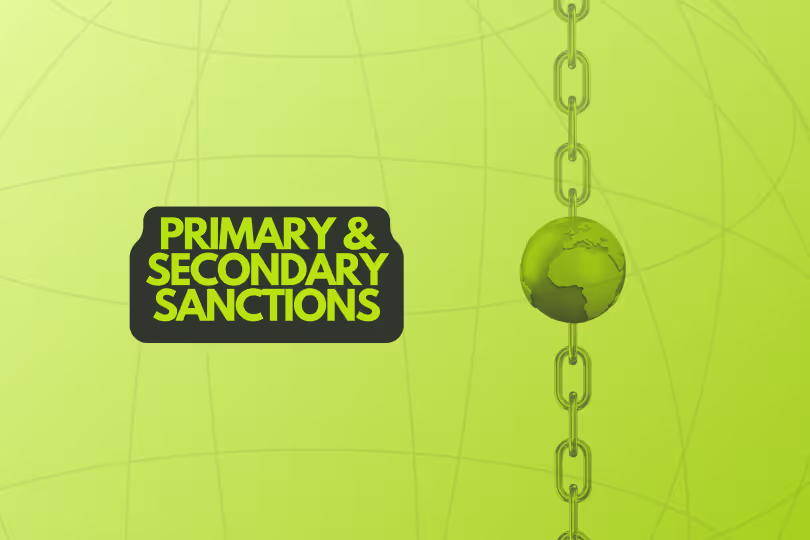
Primary And Secondary Sanctions Explained
Sanctions are important political tools that governments use to achieve their foreign policy goals or as a means to punish and discourage violations of international law. It is important to understand that sanctions are not always only applied to persons that fall within the jurisdiction of the sanctioning government but also to persons in foreign jurisdictions who trade with targets who have been sanctioned.
Sanctioning has been dominating world news since the Russian-Ukrainian conflict in February 2022. Harsh sanctions were imposed almost immediately after the invasion. The EU imposed sanctions on several oligarchs and politicians, and the Central Bank of Russia was blocked from accessing foreign-exchange reserves held abroad.
Sanctions are important political tools that governments use to achieve their foreign policy goals or as a means to punish and discourage violations of international law. Sanctions usually involve the application of economic restrictions against foreign targets (e.g. nations, government regimes, organizations, persons). However, sanctions are not always applied to persons that fall within the jurisdiction of the sanctioning government but also to persons in foreign jurisdictions who trade with targets who have been sanctioned.
{{snippets-guide}}
This dual approach to the enforcement of sanctions is often referred to as primary and secondary sanctions. Different categories of sanctions may apply to different situations, and it's important for financial entities and obliged businesses to understand what they need to do in order to achieve compliance.
Primary sanctions generally apply to US persons or to situations where there is a US nexus (such as the involvement of a US person, US-originating goods or transactions that take place within US borders). Secondary sanctions authorize OFAC or the US State Department to threaten sanctions on a person - even a non-US citizen - for a specified activity. Sanctions are intended to discourage non-US persons from engaging in specific transactions, even if these transactions are not subject to primary sanctions.
Sanctions are a strict liability regime, and the act of violation carries civil liability. Persons or entities who willfully violate sanctions may face criminal liability as well as make attempts or conspiracies to violate sanctions. Penalties may include severe monetary fines or imprisonment.
What Are Primary Sanctions?
Primary sanctions are economic restrictions. These restrictions require compliance from all persons and entities within the issuing country. In the United States, the Office of Foreign Assets (OFAC) imposes a range of sanctions, including full trade embargoes, asset freezes or seizures and travel bans against foreign targets.
OFAC primary sanctions may be imposed against countries, businesses, or individuals deemed guilty of committing international crimes or working against national security interests.
Some of the current sanction targets by the US include North Korea, Cuba, Syria, Russia and certain Chinese interests.
Who Needs to Comply With Primary Sanctions?
OFAC requires US citizens, permanent residents (located anywhere in the world), persons of any nationality located within the US, entities organized in the USA or incorporated in the US (including their foreign branches) and all transactions processed via the US financial system or in US dollars to comply with primary sanctions. Failure to comply may lead to fines of up to $1 million per violation or up to 50% of the value of the transaction.
What Are Secondary Sanctions?
Secondary sanctions are designed to prevent third parties from trading with countries subject to sanctions issued by another country - even if these third parties are not citizens of the issuing country or based in the issuing country. They may face penalties for doing business with the targeted country or individuals.
The primary difference between primary and secondary sanctions is that secondary sanctions are enforced by targeting domestic entities rather than the third party. In another example, when the US reinstated their sanctions against Iran, they reinstated secondary sanctions for non-US persons trading with Iran for sectors, including the energy, precious metal, software, food or financial services industries. Thousands of Iranians were added to the SDN list.
Unlike primary sanctions that are enforced by fines or seizure of US-held assets, secondary sanctions rely heavily on the importance of the US financial system and the use of the US dollar as a favored global reserve currency.
Secondary sanctions can enhance the effects of primary sanctions and protect the security interests of the issuing countries. For example, FinCEN (the Financial Crimes Enforcement Network) prohibited US financial institutions from opening or maintaining any correspondent accounts for or on behalf of the Chinese Bank of Dandong.
This bank was found to be in violation of the US Patriot Act by laundering money for a Chinese trade conglomerate, Dandong Hongxiang Industrial Development (DHID). This conglomerate has been found to run money laundering schemes for the benefit of the North Korean government. While targeted sanctions have already been imposed against North Korea for some time, this particular sanction hit the DHID hard as they are responsible for a large share of Sino-North Korean trade, which in turn deterred Chinese banks and financial firms located in other nations from transacting with North Korean businesses.
Who Needs to Comply With Secondary Sanctions?
Non-US entities with business relationships in the US must comply with secondary issues. If they are in violation, they may be restricted partially or totally from participating in the US financial system, including import or export restrictions. US persons who are found in violation of sanctions may find themselves on the Specially Designated Nationals and Blocked Persons (SDN) list.
Why Are Secondary Sanctions Being Discussed in 2025?
The vast majority of US secondary sanctions apply to Iran and North Korea. The sanctions have made it difficult for Iran to sell their oil globally and have been designed to make it difficult for Iran to develop a nuclear weapon.
Secondary sanctions are in the news at present due to heavy sanctions imposed against Russia by the US, UK and EU. The UK, for example, has currently sanctioned 1,730 persons under the Russia sanctions regime. While current sanctions caused inflation to a spike in Russia and caused the collapse of many of its major banks, Russia's ability to sell oil and gas to the rest of Europe has reduced the impact of trade sanctions, albeit slightly, as it helped the ruble recover some of its value. Ukraine is currently asking the US and its allies to consider secondary sanctions against Russia.
Secondary sanctions are sometimes controversial as they are sometimes considered an extraterritorial application of US laws, and some opponents of secondary sanctions say the US uses these regimes as a means of influencing the decision-making processes of countries that would not otherwise be in violation of US sanctions. There is also a risk that secondary sanctions may damage alliances across the globe, e.g. if the UK continues to buy oil and gas from Russia, the US may not take kindly to it.
Secondary sanctions are often misunderstood and can lead to over-compliance or confusion, which in turn could slow down global business.
Multinational or cross-border firms must remain compliant with primary and secondary sanctions and screen customers against all relevant sanctions lists. UK firms that conduct business with clients in both the US and Russia must carefully screen using the UK Sanctions List and OFAC Sanctions List.
When assessing sanctions-based risk, businesses and other obliged entities or persons must consider the following:
- Any entities or individuals which are SDN-listed, including entities that are majority-owned by listed entities or designated individuals;
- Whether or not there is a US connection to the proposed transaction or activity, including transacting in US dollars or through the US financial system;
- The scope of the sanctions regime, including whether sanctions all transactions/activities with SDN-listed businesses and individuals or just targeted sector-related transactions and activities;
- Whether or not sanctions are primary or secondary
{{snippets-case}}
Conclusion
Whether you are dealing with either primary or secondary sanctions, it's important to adopt accurate and rapid screening solutions that can capture and check customers' data as they are being onboarded. The ideal solution produces very few false positives and reduces the administrative burden placed on already stretched compliance officers.
These solutions should also have the ability to handle aliases, non-Western naming conventions and the use of a non-Latin alphabet. If you would like to know about sanctions.io and sanctions screening, do not hesitate to get in touch.
How sanctions.io Supports Sanctions Compliance
sanctions.io is a highly reliable and cost-effective solution for sanction checking. AI-powered and with an enterprise-grade API with 99.99% uptime are reasons why customers globally trust us with their sanctions screening needs.
To learn more about how our sanctions, PEP, and criminal watchlist screening service can support your organization's compliance program:
We also encourage you to take advantage of our free 7-day trial (no credit card is required).



